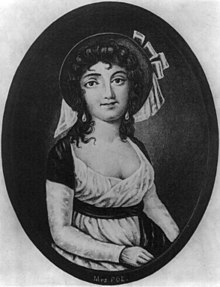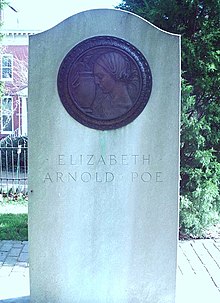Eliza Poe
Eliza Poe | |
|---|---|
 The only known image of Eliza Poe[1] | |
| Born | Elizabeth Arnold 1787 London, England |
| Died | December 8, 1811 (aged 23–24) Richmond, Virginia, U.S. |
| Resting place | St. John's Episcopal Church (Richmond, Virginia) |
| Occupation | Actress |
| Years active | 1796–1811 |
| Spouses |
|
| Children | William Edgar Rosalie |
Eliza Poe (née Elizabeth Arnold; formerly Hopkins; 1787 – December 8, 1811) was an English actress and the mother of the American author Edgar Allan Poe.
Early life

Arnold was born to Henry and Elizabeth Arnold in London in the spring of 1787.[1] Her mother was a stage actress in London from 1791 to 1795. Her father Henry is thought to have died in 1790. In November 1795, Eliza and her mother sailed from England to Boston, Massachusetts, where they arrived on January 3, 1796.[1]
w
Death

In 1811, while staying at a boarding house in Richmond, Virginia, for a performance, Eliza began spitting blood.[2] Her performances became less frequent until October 1811 when she stopped appearing altogether.[3] Her last performance was on October 11, 1811, as Countess Wintersen in a play called The Stranger.[4]
Friends and fellow actors Mr. and Mrs. Luke Usher (the name may have inspired Poe's tale "The Fall of the House of Usher"[5]) took care of the children during Eliza's illness and many in the Richmond area took an interest in her health. On November 29 of that year, the Richmond Theater announced a benefit performance on her behalf. A local publication, the Enquirer, reported her need for help: "On this night, Mrs. Poe, lingering on the bed of disease and surrounded by her children, asks your assistance and asks it perhaps for the last time".[6]
Eliza finally died on Sunday morning, December 8, 1811, at the age of twenty-four,[3] surrounded by her children.[7] It is generally assumed that she died of tuberculosis.[1][8] She is buried at St. John's Episcopal Church in Richmond. Though her actual burying place is unknown, a memorial marks the general area.[9]
After her death, her three children were split up. William Henry Leonard Poe lived with his paternal grandparents in Baltimore, Edgar Poe was taken in by John and Frances Allan in Richmond, and Rosalie Poe was adopted by William and Jane Scott Mackenzie in Richmond, Virginia.[10]
Legacy
Though he was young when she died, Edgar Allan Poe was heavily affected by Eliza Poe's death and many of his works reflect her influence. His first published work "Metzengerstein" features a fire burning down a large home, possibly reflecting the fire that destroyed the Richmond Theatre, where she had performed. The fire occurred in December 1811, only three weeks after her death.[11]
The early loss of his mother and other women, including his wife Virginia, may also have inspired Edgar Poe's often-used literary theme of dying women.[12] This theme is readily present in works like "The Raven".[13]
Notes
- ^ a b c d Sova, 192
- ^ Hoffman, Daniel. Poe Poe Poe Poe Poe Poe Poe. Baton Rouge: Louisiana State University Press, 1972: 25. ISBN 0-8071-2321-8
- ^ a b Silverman, 8
- ^ Thomas, Dwight and David K. Jackson. The Poe Log: A Documentary Life of Edgar Allan Poe 1809-1849. New York: G. K. Hall & Co., 1987: 12. ISBN 0-7838-1401-1
- ^ Allen, Hervey. Israfel: The Life and Times of Edgar Allan Poe. New York: Farrar & Rinehart, Inc., 1934: 683.
- ^ Cite error: The named reference
Meyers6was invoked but never defined (see the help page). - ^ Cite error: The named reference
Stashower35was invoked but never defined (see the help page). - ^ Stashower, 7
- ^ Case, Keisha. Edgar Allan Poe in Richmond. Arcadia Publishing, 2009: 13. ISBN 978-0738567143
- ^ Sova, 193
- ^ Hutchisson, James M. Poe. Jackson: University Press of Mississippi, 2005: 38. ISBN 1-57806-721-9
- ^ Weekes, Karen. "Poe's feminine ideal", collected in The Cambridge Companion to Edgar Allan Poe, edited by Kevin J. Hayes. Cambridge University Press, 2002: 149. ISBN 0-521-79727-6
- ^ Kopley, Richard and Kevin J. Hayes. "Two verse masterworks: 'The Raven' and 'Ulalume'", collected in The Cambridge Companion to Edgar Allan Poe, edited by Kevin J. Hayes. New York: Cambridge University Press, 2002: 194. ISBN 0-521-79727-6
Sources
- Meyers, Jeffrey. Edgar Allan Poe: His Life and Legacy. New York City: Cooper Square Press, 1992. ISBN 0-8154-1038-7.
- Silverman, Kenneth. Edgar A. Poe: Mournful and Never-ending Remembrance. New York City: Harper Perennial, 1991. ISBN 0-06-092331-8.
- Sova, Dawn B. Edgar Allan Poe: A to Z. New York: Checkmark Books, 2001. ISBN 0-8160-4161-X.
- Stashower, Daniel. The Beautiful Cigar Girl: Mary Rogers, Edgar Allan Poe, and the Invention of Murder. New York: Dutton, 2006. ISBN 0-525-94981-X.
Further reading
- Smith, Geddeth. The Brief Career of Eliza Poe. Fairleigh Dickinson University Press: April 1988.
External links
- "Market Lass: The Myriad Roles of Elizabeth Poe" by Maggi Smith-Dalton at Boston Singers Resource
- Eliza Poe at Poedecoder.com
